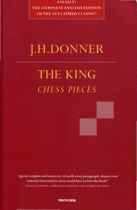King, The
Jan Hein Donner

The other day I happened to visit a tournament and, as is often the case, I was dragged into a conversation with some guy in the book room. I mentioned THE KING and he didnt seem interested. I asked him if he liked my book about Benko and he went crazy: “Who wants to read about a guys life? I want moves! And who wants to hear about him smoking dope in the back of a van?
“Well, I replied, “a lot of people might find it interesting to understand the man behind the moves. Thats why I love THE KING so much, its filled with… He cut me off, his voice raising a few octaves: “What Benko did was illegal! Illegal! Besides, the people I know only want moves. Everything else is boring. And who is this Donner idiot anyway? Were talking about chess, and chess is all about moves!
Fighting back the urge to castrate the unimaginative fellow verbally, I walked away. But he does have a point: if you hate chess history, and you hate literature, and you hate reading real words, and you hate humor and color and a completely original look into the mind of a grandmaster (and grandmaster chess), then dont buy this book.
If this isnt enough, allow me to add a small warning: THE KING isnt about analysis or lots of games or instruction (though it has some of that here and there). Its pure literary magic. It humanizes grandmasters, it shows you the incredibly insane situations that some of our chess heroes can find themselves in, it goes deep into the psychology of winning and losing, and well, lets look at a couple of examples.
Donners ability to mix humor, sarcasm, and profundity in any situation was legend. Here we see him flaying alive his favorite whipping boy, Lodewijk Prins:
“Where lies Lodewijks strength? He plays a hideously crooked kind of chess, but not without success. If correct play and good judgment were what counted in chess, he would never win a game. Then what is it that enables him to keep his head above water, from a chess point of view?
“At long last, I have come to understand: its his incorrigible optimism. When he is in a bad position, he doesnt realize it, so he doesnt waste his energy on the worries a more accomplished player would have had in his place. When the position is totally drawn, he is not handicapped by the despondency of the expert, who knows there is nothing to be achieved unless his opponent is willing to lend a helping hand.
In our next example, we see Donnor suffering for a long time in an uphill struggle to save a game. The room has emptied and all is quiet, when the following mini-drama (in which his opponent illegally retracts a played move) occurs:
“Slam!, he touches the bishop, and lets go at once. I immediately turn to the assistant-referee/move-administrator, who is sitting next to the board the only living soul in the cavernous playing hall at this early hour. Hes reading the newspaper. I dont even try to protest. Theres no resisting evil when youre alone and forsaken.
“My glaring look gets no response from my opponent either. He starts to wheeze and puff, as if he has burnt himself. I look at his shifty hands, his ringed and hairy fingers, chubby and purple from grabbing in blouses and little boys pants.
Donners acid tongue is apparent, but it might surprise the reader to know that he was one of the most self-deprecating men Ive ever encountered. His tendency to publish (and make fun of) his many losses is seen throughout THE KING. In one game, which he unjustly won, he had this to say:
“The ultimate truth about chess is that it is a game of chance. All a chess player can do is react to opportunities and possibilities which are provided from outside and for which he can only hope and wait. This profound understanding of chance as a factor in the game of chess, this realization of ones actual passivity, is only given to the very strong and even to most of them only when they begin to be advanced in years.
“Naturally, they will keep silent about this so as not to confuse the broad masses of the poor in spirit. For they, the common chess players, will gladly admit with great modesty that chance plays an important part in their games, but they always hope that this is not the case with grandmasters, the infallible ones, who see everything and know everything. I wont rob these innocents of their illusion, but there is no need for us to fool each other.
Heres Donners reaction when he lost a match to Hans Ree:
“After I resigned this game with perfect self-control and solemnly shook hands with my opponent in the best of Anglo-Saxon traditions, I rushed home, where I threw myself onto my bed, howling and screaming, and pulled the blankets over my face. For three days and three nights the Erinnyes were after me. Then I got up, dressed, kissed my wife and considered my situation.
There is so much more, but you really should buy the book, sit back, and have one of the most entertaining and thought provoking reads of your life.
THE KING gets my highest recommendation!
